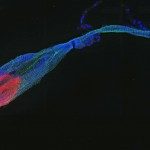Link to Pubmed [PMID] – 15253774
Malar. J. 2004 Jul;3:24
The protozoan Plasmodium falciparum has a complex life cycle in which asexual multiplication in the vertebrate host alternates with an obligate sexual reproduction in the anopheline mosquito. Apart from the apparent recombination advantages conferred by sex, P. falciparum has evolved a remarkable biology and adaptive phenotypes to insure its transmission despite the dangers of sex. This review mainly focuses on the current knowledge on commitment to sexual development, gametocytogenesis and the evolutionary significance of various aspects of gametocyte biology. It goes further than pure biology to look at the strategies used to improve successful transmission. Although gametocytes are inevitable stages for transmission and provide a potential target to fight malaria, they have received less attention than the pathogenic asexual stages. There is a need for research on gametocytes, which are a fascinating stage, responsible to a large extent for the success of P. falciparum.

